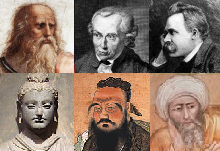| 系列条目 |
| 哲学 |
|---|
 |
| 哲学家 |
| 传统 |
| 时期 |
| 文献 |
| 分支 |
| 列表 |
| 杂项 |
分析哲学(英语:analytic philosophy或analytical philosophy),一种哲学分支与传统,强调语言清晰,逻辑严谨,与欧陆哲学相反。[1]分析哲学自二十世纪初至今,仍是英文国家的大学哲学系主流,包括英国、美国、澳大利亚等。[2][3]
现代发展
逻辑原子论
英国学者维特根斯坦1921年,发表《逻辑哲学论》,提出语言可以表达,就可以表达清楚。全部有认知意义的语句都有逻辑形式及真假值,而复杂语句可以分拆成更简单的语句。[4]
日常语言哲学
二战后,维特根斯坦抛弃逻辑原子论,其《哲学研究》转向日常语言哲学,认为语言本身的意思并不重要,人亦不应该探究语言应该如何使用才是正确,反而语言是观察,人怎样用语言,语言就有什么意思,“意义即用法”。[5]罗素依然坚持逻辑原子论,并认为日常语言哲学是荒谬。
后设伦理学
G.E.摩尔在1903年发表《伦理学原理》,以语义探究伦理学,开创后设伦理学。G.E.先生探究伦理学的概念“好”(good),但他无法将这概念等同于任何经验事实(例如他不认同“好”是等于“令人开心”),而认为“好”是不可定义,并且认为自然主义是有谬误。[6]
A.J.艾耶《语言、真理与逻辑》1936年提出情绪主义,用逻辑实证主义检验原则否定伦理学,认为道德价值“好”,不可以用经验检证,而道德句子表达出情绪,但并无认知意义,非真亦非假。[7]不过,21世纪已有哲学家质疑逻辑实证主义基础。林火旺指出,艾耶情绪主义的论证基础有问题。艾耶情绪主义的论证基础是“检证原则”,但“检证原则”不可以检证出“检证原则”本身。因为“检证原则”主张有意义的命题,如果不是分析命题,就是可以检证的综合命题。当“检证原则”尝试检证“检证原则”本身,就会得出“检证原则”本身是没有认知意义[8]。
认识论
美国哲学教授葛梯尔1963年提出葛梯尔问题,研究“知”的定义,什么情况人才算“知”。他疑惑,如果论证前提全部是假,但恰巧结论是真,那人算不算知道结论。[9]
代表性人物
参见
参考资料
- ↑ "Without exception, the best philosophy departments in the United States are dominated by analytic philosophy, and among the leading philosophers in the United States, all but a tiny handful would be classified as analytic philosophers. Practitioners of types of philosophizing that are not in the analytic tradition—such as phenomenology, classical pragmatism, existentialism, or Marxism—feel it necessary to define their position in relation to analytic philosophy." John Searle (2003), Contemporary Philosophy in the United States in N. Bunnin and E. P. Tsui-James (eds.), The Blackwell Companion to Philosophy, 2nd ed., (Blackwell, 2003), p. 1.
- ↑ See, e.g., Avrum Stroll, Twentieth-Century Analytic Philosophy (Columbia University Press, 2000), p. 5: "[I]t is difficult to give a precise definition of 'analytic philosophy' since it is not so much a specific doctrine as a loose concatenation of approaches to problems." Also, see Stroll (2000), p. 7: "I think Sluga is right in saying 'it may be hopeless to try to determine the essence of analytic philosophy.' Nearly every proposed definition has been challenged by some scholar. [...] [W]e are dealing with a family resemblance concept."
- ↑ See Hans-Johann Glock, What Is Analytic Philosophy (Cambridge University Press, 2008), p. 205: "The answer to the title question, then, is that analytic philosophy is a tradition held together both by ties of mutual influence and by family resemblances."
- ↑ Ludwig Wittgenstein. Tractatus Logico-Philosophicus.
- ↑ Wittgenstein, Ludwig (2001) [1953]. Philosophical Investigations. Blackwell Publishing
- ↑ Warnock, Geoffrey. Honderich, Ted , 编. The Oxford Companion to Philosophy. Oxford: Oxford University Press. 1995: 585. ISBN 0-19-866132-0.
- ↑ Ayer, A. J. (1952) [1936]. "Critique of Ethics and Theology". Language, Truth and Logic. New York: Dover Publications. ISBN 0-486-20010-8.
- ↑ 林火旺. 《倫理學》. 台湾: 五南. 2004: 199. ISBN 9789571135090.
- ↑ Gettier, Edmund, Is Justified True Belief Knowledge? (PDF), Arguing About Knowledge (Routledge), 2020-07-15: 14–15, ISBN 978-1-003-06103-8, doi:10.4324/9781003061038-5